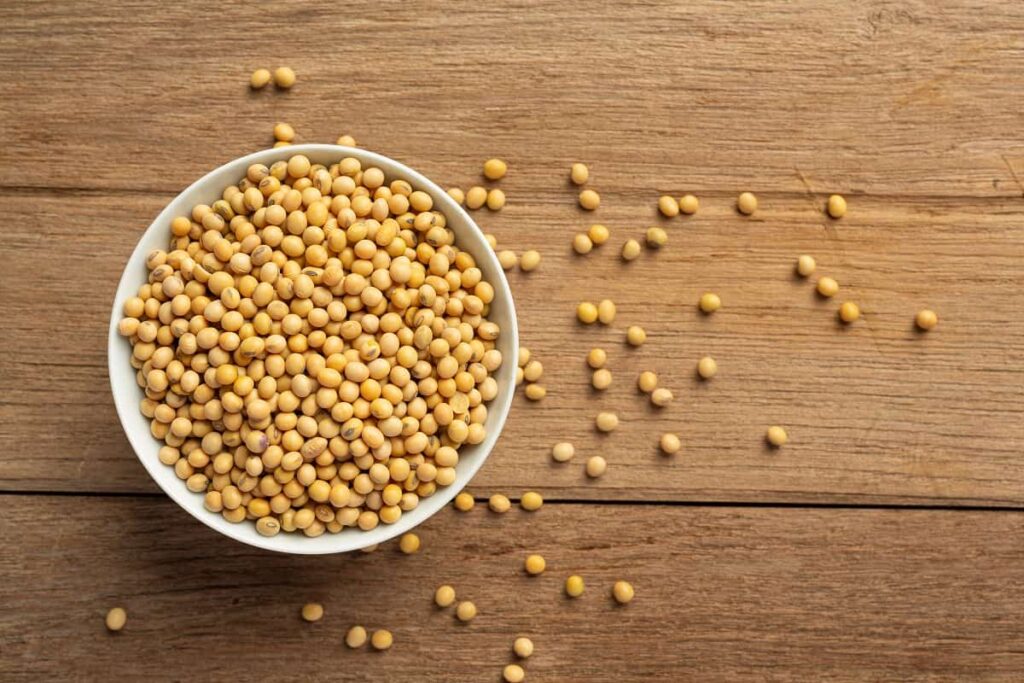Protein consumption is essential for all athletes, especially those in endurance exercise. However, athletes frequently focus on carbohydrate rather than protein intake, which can harm health and overall athletic performance. Protein levels are crucial for muscle growth and repair.
If an athlete’s diet lacks protein, it could counteract the benefits of exercise and raise their risk of weariness and anemia. A daily protein intake helps keep athletes sharp and gives their bodies the nutrients they need to keep up with frequent workouts.
There are numerous protein options, but athletes must learn and understand what works best as per their lifestyle. Let’s look at the three main proteins available on the market.
Top 3 Protein – Soy, Whey, and Casein
There are three main proteins: whey protein, soy protein, and casein protein. Each of these proteins has its advantages. Therefore, you must get to know about each of them. Here is an analysis of each protein source.
Soy Protein

Soy protein is a plant protein created by processing soybean meal. This isolate is composed of 90-95% protein and low carbohydrates. As a result, you can blend it with other nutrients to increase taste, texture, and nutritional value.
Soy protein isolate is a prominent ingredient in many processed foods and dietary supplements. It is most often consumed by vegetarians and vegans as a meat substitute or protein supplement.
Whey Protein
Cow’s milk is used to make whey protein. The milk is first pasteurized to eradicate any microorganisms. After that, casein (milk solids used to produce cheese) is separated from the whey using specific enzymes.
The whey is treated further to eliminate carbohydrates, lipids, and surplus water. What is left is whey concentrate. Whey isolate and hydro-isolates will be produced as a result of further processing.
Casein Protein

Similar to whey protein, casein protein is derived from milk. It accounts for 80% of the protein in cow’s milk, which makes it a more plentiful alternative. Casein protein includes essential amino acids which your body needs for growth and repair. Since this protein digests more slowly than other proteins, it may be more effective at suppressing appetite and enhancing feelings of fullness.
Trestolone: Ultimate Guide to Potent Steroid and How to Use It Safely
What Protein Source is Best for Athletes?
A study on male athletes examined the effects of soy and whey protein ingestion on muscle mass growth. Both whey and soy consumption enhanced muscle mass when paired with exercise training.
It also found no significant difference in muscle mass growth between the two protein sources. This disproves the widely held belief that whey is an excellent protein source for increasing lean body mass than soy.
Additionally, this study found that, in addition to increasing muscle mass, soy protein contains crucial antioxidants that whey does not. So, while whey and soy protein enhance muscle mass when combined with exercise, soy protein has the extra benefit of carrying antioxidants.
Can The Timing of Protein Consumption Affect Muscle Repair and Building?
According to sources, the timing of protein consumption can affect muscle repair and building. Soy protein has been determined to have the fastest absorption rate of any protein.
Since soy protein absorbs quickly, it enables rapid muscle repair following consumption. As a result, whey protein is ideal for pre-workout feed (the protein may be used fast) and post-workout recovery (to rebuild the broken muscles).
On the other hand, whey protein has an intermediate absorption rate, making it less helpful in quickly rebuilding muscle, yet, it is essential in forming new muscle tissue.
Finally, casein protein has the slowest absorption rate yet raises plasma amino acid levels for the longest time. These free amino acids can create muscle even after working out.
Each protein source has unique benefits, and integrating all three into a meal regimen can stimulate muscle synthesis after exercise and keep it going for several hours afterward.
Can These Protein Supplements Boost Testosterone?
Both men and women require optimal testosterone levels. In addition to increasing muscular growth, adequate testosterone levels improve muscle recovery, libido maintenance, and mood. So, how do whey and soy affect testosterone levels?
In a recent meta-analysis of clinical studies, results have shown that neither soy nor isoflavone intake affects male reproductive hormones. Therefore, men consuming soy protein don’t lower their testosterone levels after weight training.
At the same time, soy protein does not increase the estrogen hormone in men, and it doesn’t affect their immunity in any way. Instead, the protein can help in weight-training exercises and increase muscle mass.
A study showcased that whey protein can increase testosterone levels in men. Having said that, additional research is needed to assess the relationship between whey and soy and testosterone.
Bottom-line
Since soy, casein, and whey proteins have high absorption rates, they all provide significant results when eaten frequently after workouts. Soy is becoming popular as a cheaper option to use among athletes while having the same value as whey protein. For lactose intolerant, soy is the best option as it is a plant-based protein without lactose sugar.
Therefore, make a decision depending on your lifestyle and individual goals. Pick a protein powder that fits your budget, fitness goals, and taste preferences.
Remembering that protein supplements aren’t magic pills for getting ripped is crucial. They are intended to supplement your current diet and ensure you satisfy your protein requirements for faster muscle recovery and mass gain.
When using protein shakes for exercise, ensure you also eat healthy, protein-rich foods like fish, chicken, eggs, cheese, yogurt, beans, and almonds.

